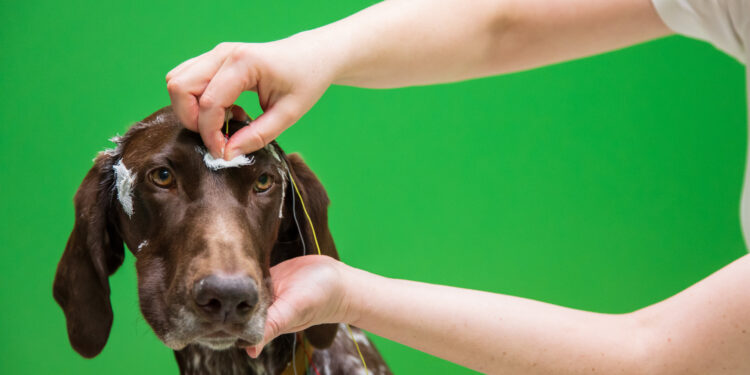Dog preparing for an EEG test. Credit: Oszkár Dániel Gáti
Flat-faced dog breeds are popular all over the world. In the United States and Hungary, the French bulldog is currently the most common breed. However, their popularity comes at a high health cost: shortened skulls are associated with deteriorated morphological changes in the brain, breathing difficulties, and sleep problems.
According to recent findings from Hungarian researchers, flat-faced dogs sleep more because their breed-specific sleep apnea increases daytime sleepiness, their REM sleep phase is longer than that of non-REM sleep, and their sleep EEG patterns show signs of white matter loss.
Although a health hazard, the large round head can be an attractive feature for many people. Extremely flat-faced dogs, such as French and English bulldogs and pugs, live on average 3 to 4 years less than other dogs and often do not live to adulthood. Even during their short lives, they suffer from numerous illnesses and undergo surgeries to correct musculoskeletal, eye and respiratory problems. Abnormal skull shortening is also associated with a distorted and rounded brain, but it is not yet clear how this affects neuronal functioning.
Hungarian researchers studied the sleep of 92 family dogs using EEG. “In the sleep laboratory, dogs spend about three hours with their owners. Since nothing exciting is happening, the dogs quickly fall asleep. During this time, we conduct the electrical potential generated by brain activity with electrodes stuck to their scalp,” says Anna Kis, a pioneer in the study of sleeping dogs and a researcher at the HUN-REN Institute of Cognitive Neuroscience and Psychology.
“We wanted to test whether flat-faced dogs slept differently to other dogs, as they are known to suffer from a lack of oxygen due to breathing problems and therefore have poorer quality sleep. We found that dogs flat-faced sleep more over the three hours.”
“But when we studied EEG patterns, we got more interesting results than that,” continues Zsófia Bognár, a Ph.D. student who has been studying shorter-nosed dog breeds, scientifically known as brachycephalic dogs, for many years.

Dog waking up after sleeping. Credit: Enikő Kubinyi
When studying cognitive functions, special attention is paid to the paradoxical phase of sleep, also called paradoxical sleep, due to high-frequency brain activity similar to wakefulness accompanied by muscle atonia. For example, previous research has shown that the amplitude of beta and delta brain waves (measured via EEG) during REM sleep is associated with successful learning in dogs and intelligence in humans.
“In the present study, we found that brachycephalic dogs had decreased beta waves and increased delta compared to dogs with longer noses. Sleep spindle frequency increased. This pattern has previously been associated with learning lower in dogs and a loss of white matter in humans,” says Ivaylo Iotchev, first author of the study published in the journal Structure and function of the brain.
“There may be several reasons for our results. The most interesting of these is that it appears that flat-faced dogs have retained the sleep pattern of childhood, similar to newborns who spend more time in paradoxical sleep.
It is widely believed that brachycephalic dogs are selected for their infant-like characteristics.
“They have big heads and eyes, high foreheads, and small noses because we humans find these traits irresistibly attractive. This is how babies trick us into caring for them. It’s possible that “The selection of dogs with an infantile appearance has also infantilized their brain function,” says Enikő Kubinyi, professor and head of the MTA-ELTE Lendület Companion Animal Research Group “Momentum” and the ELTE Canine Brain Research Group NAP.
“But this is a bold hypothesis at the moment. What is very likely, however, is that selection for brachycephalic heads leads to potentially dangerous changes in brain function.”
More information:
Ivaylo Borislavov Iotchev et al, Physiological sleep correlates of brachycephaly in dogs, Structure and function of the brain (2023). DOI: 10.1007/s00429-023-02706-y
Provided by Eötvös Loránd University
Quote: The shape of dogs’ heads affects their sleep, according to a study (December 13, 2023) retrieved December 14, 2023 from
This document is subject to copyright. Apart from fair use for private study or research purposes, no part may be reproduced without written permission. The content is provided for information only.



